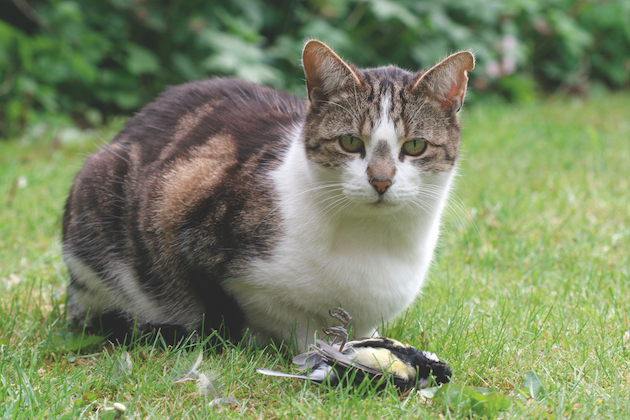Just how many songbirds do domestic cats kill every year?
A report estimates 27 million songbirds are killed annually by cats in the UK

At Flea Barn, I have developed a now cherished routine. First, I check the grey partridges nesting in their pens and then the traps. After that, I take a stroll around the margins, trying to do my best impression of a keeper, peering at tracks and studying feathers I find on the rides.
On Monday, there were no chicks to report and a solitary rat comprised the total catch from the traps. All seemed serene and largely predator free. It was too perfect to go home immediately, what with the heat of the sunshine, the rasping of the grasshoppers, the accompanying hum of bees and the coo-cooing of the woodpigeon.
Warning calls
Not wanting to break the soporific spell, I leaned against a calloused old hornbeam to enjoy my solitude, letting the soundscape wash over me. The peace of this perfect moment was broken by the discordant and repeated chang, chang, chang of a blackbird’s warning call coming from the wood. The cry was taken up by numerous others.
The blue tits chortled, then the robins joined in, their flint upon flint alarm filling the air with disquiet.
I looked skywards for the usual suspects that cause such rancour. I could see no cackling magpie or jay hopping through the branches, nor shadow cast by a patrolling crow or raptor. Intrigued, I heaved myself up to investigate. Some 30 yards away, I spied the culprit. Coming out of the wheat stole a cat. As it stalked, it raised each front paw theatrically, holding it aloft for a lengthy pause, before carefully placing it down. Its sleek black fur shone like a jackboot in the sunlight. A red collar adorned its neck, ruining the perspective-caused impression that I was watching a hunting black panther.
Stunned, horrified and indignant in equal measure at this unwelcome apparition, I started forward, clapping my hands and blurting out “shoo, shoo” in a passable impression of Kenneth Williams. I received the briefest of glares from the cat and it was off like the wind, back into the crop. With the peace now shattered, I made my way home.
Domestic cats killers of songbirds
Later that day, I mentioned my feline run-in to Alexander Lees, an ecologist and lecturer at Manchester Metropolitan University. He kindly sent me some research undertaken in the USA by biologists Scott R Loss, Tom Will and Peter P Marra on the impact cats make on wildlife in the USA.
The report estimates that free-ranging domestic cats kill between 1.3 and four billion birds annually. The research concludes that domestic cat predation is most likely the single greatest man-created source of wild mammal and bird mortality. Similar studies have been undertaken in the UK.
It is challenging to produce precise figures. Owners of free-ranging cats cannot accurately report on how many creatures their pets kill. A report by the Mammal Society, cited by the RSPB, stated that a conservative estimate of 27 million songbirds are killed annually by cats in the UK.
The data is largely based on the tally of cadavers that cats bring back to owners’ homes. The additional numbers of birds that are either eaten or hidden away from the residence is not recorded.
The Cats Protection League estimates the number of feral felines in the UK at around one million. Therefore, if the US research is correct and feral cats each kill between 80 and 100 animals per annum, at least 80 million bird and mammal deaths could be attributable to feral cats alone. Yet there are a further 8.5 million British pet moggies out on the prowl, shown by the red collar on the marauder I disturbed at Flea Barn.
RSPB defence
The RSPB defends the cat, claiming: “It is likely that most of the birds killed by cats would have died anyway from other causes before the next breeding season.”
No scientific evidence is given to support
this claim. If such a large number of indiscriminate wildlife deaths were attributed
to men with guns, there would be uproar. My hope is that cat owners, at the least, take up the call to ‘bell’ their pets. British wildlife would be better off and the birds of around my home would be markedly happier.








